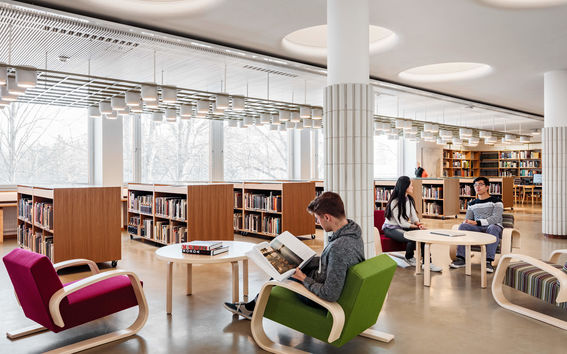Aalto University Summer School
Aalto University Summer School offers high-quality academic summer courses and programs at Aalto University during the winter and the summer.

This article concerns the Health and Wellbeing Architecture Summer Intensive "Learnings from the Pandemic" organised in August 2020. Information about this year's courses can be found on the Aalto University Summer School course page.
Health and Wellbeing architecture affects all of our surroundings
Responding to a global pandemic requires participation from all walks of life. Architecture and design are fields that form our everyday environments. Their significance to our health and wellbeing cannot be underestimated. That is what professor Laura Arpiainen has her eyes on as the leader of an intensive summer course on Health and Wellbeing Architecture.
‘Any emergency brings out great creativity. We should be quick to take a look at which ideas bear longer and more sustained use’ says Arpiainen, who wants to see a change in how we perceive the role of architecture and design. In her view, we should be able to examine the decisions and alterations from the pandemic and make use of them in our everyday lives.
‘It is easy to simply link health architecture to hospitals and other healthcare facilities. During COVID-19 we have witnessed a global realization that health and wellbeing should be applied to all design, construction and planning processes’ Arpiainen stresses.
It is crucial to explore the ideas, observations, challenges and opportunities presented by the COVID-19 pandemic from a multi-disciplinary perspective. That is the setting for this new course aimed at both students and professionals interested in increasing their preparedness and competencies.
‘There is no single remedy to what we are experiencing right now. For many people, almost all aspects of life have changed. This intensive brings together guest speakers and students from very different fields to generate discussion and new ideas’ Arpiainen says.
There are many ways in which architecture and design can help prevent the spread of infections. Detailing, material use, service and flow planning are some to begin with, but Arpiainen has also invited international guests to fill in their expertise on other solutions.
‘There is a powerful argument that the built environment either causes health or harms health. One of the guest speakers, Tye Farrow from Canada, speaks eloquently how we can create environments that enrich us all’ Arpiainen introduces. Another guest is Reid Ewing, Professor of City and Metropolitan Planning at the University of Utah. Ewing is among the first to publish peer-reviewed research on the effects of the pandemic on urban planning. Professor Ana Betancour from Sweden will introduce a global perspective including effects of the pandemic in the third world.
Professor Laura Arpiainen is excited to organize the course online as it allows participation from all around the world. Aalto University Summer School has a heavy emphasis on challenge-based and interactive online learning, and this intensive is no exception.
‘The course is structured so that the beginning of the week is packed with lectures, discussion and Q+As and the latter part is dedicated to intensive mentoring, brainstorming and workshopping ideas to create new interventions, designs and policy recommendations’ Arpiainen elaborates.
The participants can choose their focus to best align with their own interest and specialty. Some suitable points-of-view for the course include healthcare, housing, urban health, residential care, global issues and work environments.
‘I welcome graduate students, doctoral students and professionals from all fields who want to improve their knowledge of designing for wellbeing. This course will increase everyone’s pandemic preparedness and teach us that there is an opportunity in every hardship’ Arpiainen concludes.
Health and Wellbeing Architecture Summer Intensive "Learnings from the Pandemic" ran online August 10 - August 14 2020. The registration is now closed. Information about this year's courses can be found on the Aalto University Summer School course page.

Aalto University Summer School offers high-quality academic summer courses and programs at Aalto University during the winter and the summer.


